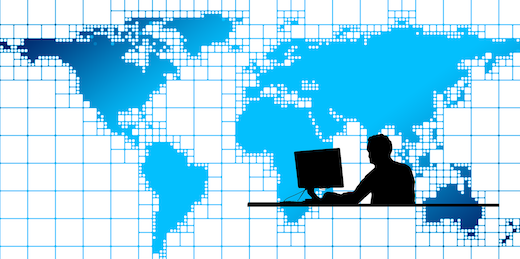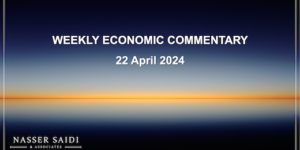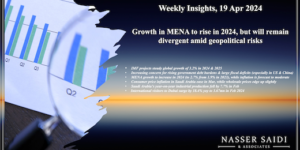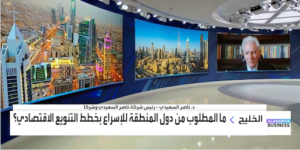Markets
The gains to new all-time records on US stock markets last week followed the approval by both Houses of Congress of the tax reform cutting both corporate and income tax rates. The upbeat mood spread to most emerging market and Japan, nevertheless the Eurozone index was negatively affected by the Catalan election where independentist parties won the majority of seats, but not the majority of the votes. Regional markets were mixed but Qatar again recorded another weekly jump of almost 5%. In US bond market the tax reforms and the expected higher government deficit pushed inflation expectations to the highest since Apr with the US 10y breakeven rate now at 1.94%. In currency markets the euro gained sharply on the dollar and, despite retrenching somewhat after the vote in Catalonia, remained well above 1.18. Oil prices crawled up as inventories fell by 6.5 mn barrels per day (bpd), way above predictions of a 3.5mn bpd drawdown. Higher inflation expectation lifted up gold prices together with the spectacular plunge in the bitcoin that some have come to view as an alternative to gold holdings.
Global Developments
US/Americas:
- Both House of US Congress voted to approve Trump’s controversial tax reform.
- US real GDP growth in Q3 was revised down to 3.2% qoq ann from 3.3% in the second estimate, almost similar to 3.1% in Q2. Real disposable income grew 0.5% vs 2.7% in Q2; the saving rate dropped to 3.3%, the lowest since 2007. Profits shot up 4.3% qoq (not annualized), compared to 0.7% in Q2. Gross domestic income growth declined to 2% after 2.3% in Q2.
- The US PCE deflator increased 0.2% mom (1.5% yoy) in Nov, vs 0.1% (1.4% yoy) in Oct. Core PCE ex food and energy rose 0.1%. PCE inflation is still below the 2% Fed’s target, but for now the figure is unlikely to alter the prevailing expectations of 3 additional rate hikes in 2018.
- The US current account deficit in Q3 shrunk by USD 23.8bn to USD 100.6bn, with all major components improving from Q2. The goods deficit narrowed by USD 6.2bn, and the services surplus increased by USD 1.2bn. As a share of GDP, the deficit dropped to 2.1% from 2.6% in Q2.
- US nominal personal income grew 0.3% mom in Nov down from 0.4% in Oct. Wages and salaries rose 0.4%, mom vs 0.2% in Oct. The personal saving rate dropped to 2.9% in Nov from 3.2% in Oct.
- Real spending in the US rose 0.4% mom in Nov up from a flat reading in Oct and 0.6% in the prior two months. Gains were led by non-durable goods, while spending on real durable goods was sluggish. Prices rose 0.2% mom and nominal spending grew 0.6% mom.
- US total housing starts increased 3.3% mom (12.9% yoy) in Nov, but total completions collapsed -7.2% yoy to 1.67 mn units, their lowest level for circa two decades.
- Existing-home sales in the US shot up 5.6% mom in Nov to 5.81 mn units at a seasonally adjusted annualized rate, near their highest level in 11 years. Gains were led by single-family homes sales.
- New-home sales in the US in Nov surged 17.5% mom (27% yoy) to 733,000 units ann, sa.
- New orders for US durable manufactured goods in Nov surged 1.3% mom offsetting the -1.2% loss in Oct. Nondefense aircrafts led the gains (14.5% mom), while core capital goods fell -0.1% mom.
- The Conference Board’s Leading Indicators Index rose 0.4% in Nov vs 1.2% in Oct. ISM new orders, consumer expectations for business conditions, and the interest rate spread pushed up the index, while jobless claims, building permits, and new orders ex defense and aircrafts were a drag.
- US initial claims for unemployment benefits after dropping for 4 weeks, increased 20,000 to 245,000. The 4-week moving average rose 1,250 to 236,000 and continuing claims by 43,000 to 1.932 mn.
- Argentina’s GDP expanded 4.2% yoy in Q3 after 2.9% in Q2. Domestic demand growth accelerated, stimulated by the investments pick up encouraged by stable macroeconomic conditions.
Europe:
- Wages and salaries per hour worked in the Eurozone increased 1.6% yoy in Q3, following 2.1% in Q2, which was the highest rate in 2 years.
- The Eurozone’s current account surplus expanded to EUR 35.9bn in Oct from EUR 33.3bn in Oct 2016. The services surplus widened sharply to EUR 6.7bn from EUR 2.8bn a year earlier, while the goods surplus shrunk to EUR 27.3bn from EUR 28.5bn in Oct 2016.
- The Eurozone consumer confidence index rose to 0.5 in Dec from 0 in Nov, the top score since Jan 2001.
- The German Ifo Business Climate Index in Dec was 117.2, near the record high of 117.5 touched in Nov. The near future outlook (influenced by political uncertainty) worsened, but the assessment of the current situation rose. Confidence in all industrial sectors was down, except for construction and retail.
- The UK current account deficit narrowed to GBP 22.8bn in Q3 (4.5% of GDP) from GBP 25.8bn in Q2 (5.1% of GDP).
Asia Pacific:
- China’s new home prices in 70 major cities increased 5.1% yoy (0.3% mom) in Nov vs 5.4% (0.3% mom) in Oct, the lowest rates since Mar 2016. In Beijing and Shanghai, prices declined by -0.2% yoy. The real estate market felt the impact of the authorities’ restrictions imposed since Mar in at least two dozen cities.
- The Bank of Japan did not alter its policy course and kept the monthly asset purchase target at JPY 80tn.
- Japan’s Trade surplus in Nov was JPY 113.4bn vs JPY 146.5bn a year earlier and expectations of a JPY -55bn deficit. Exports surged 16.2% yoy, with sales to China at record high. Imports were the highest since Jul 2015.
- Taiwan Industrial production was up 0.9% yoy in Nov vs 2.5% in Oct, led by rubber and chemical materials output. Manufacturing production increased 1.2% yoy, while electricity and gas output rose 3.5% yoy.
- Singapore Trade surplus rose to SGD 4.35bn in Nov from SGD 4.17bn in Nov 2016. Total exports grew by 9.6% yoy vs 10.3% in Oct while imports went up by 10.7% down from 16.0% in Oct.
Bottom line: The US tax bill makes paves the way for a consistent stimulus to the US economy in 2018, although the higher deficit will raise inflation expectations and sap bond prices. The long-term impact hinges on whether the boost will be powerful enough to generate enough tax revenues to fill the gap. In Europe meanwhile all leading indicators and key variables are hovering around multi-year record highs. Such strength can only be derailed by political shocks: the Catalan elections have excited the separatists, while in Germany almost 3 months after the general election a government is not in place. Looking ahead the elections in Italy expected for early March will most likely produce a hung Parliament or a majority of anti-euro parties.
Regional Developments
- Bahrain’s Khaleeji Commercial Bank listed on the Dubai Financial Market exchange, bringing the number of dual listings on the exchange to 14 including four Bahraini companies.
- Egypt’s production of natural gas touched about 5.5bn cubic feet this year, thanks to new discoveries, up from 4.6bn in 2016. The Egyptian Natural Gas Holding Company aims to stop importing liquefied natural gas from abroad by the end of next year, according to a senior official.
- China ranks sixth of all source countries of investments in Egypt: China’s direct investments into Egypt grew by USD 106mn (+75%) in H1 this year.
- Egypt’s gold reserves dipped by 0.3% in Q4, recording 76.3 tonnes compared to 76.6 tonnes last year, reported the World Gold Council.
- Egypt’s Financial Regulatory Authority issued a formal warning on dealing with cryptocurrencies stating that not only are such transactions not subject to any supervision, but that it also does not permit any of these currencies or even dealing in products related to them.
- Banking sources revealed that Egypt has asked banks for proposals to arrange US dollar-denominated Eurobonds, reported Reuters.
- Unemployment rate in Jordan increased by 0.5% qoq to 18.5% in Q3 this year; the rate was 15.4% (+2.0% qoq) among males and a high 30% (-3.9% qoq) among women.
- Kuwait aims to produce 15% of power from renewable energy by 2030, according to the new electricity minister.
- Lebanon’s share from the potential gas revenues will be at least 55% – in line with the world average, stated the country’s energy and water minister.
- The European Commission disclosed a new EUR 44mn (USD 52mn) assistance package to Lebanon, aimed at supporting 3 programs: stability through the improvement of socio-economic conditions, waste treatment, and electoral process.
- Omani government’s budget deficit was OMR 198.9mn in Oct down from 223.9 in Sep.
- M2 Money supply in Oman decreased to OMR 16.05bn in Oct from OMR 16.1bn in Sep. Total conventional bank loans increased 3.6% yoy in Oct up from 3.0% in Sep.
- Oman’s inbound tourism spending in 2016 rose3% yoy to OMR 316mn.
- Foreign deposit outflow slows in Qatar: foreign customers’ deposits at banks in Qatar fell by just QAR 2.8bn (USD 763mn) from the previous month to QAR 134.9bn in Nov.
- Saudi Arabia released a record state budget for 2018: plans are to increase spending to a record SAR 978bn (USD 261bn) in 2018 (up from SAR 890bn in 2017 budget plan, but below the SAR 926 actual spend this year). The 2018 deficit is projected at SAR 195bn, or 7.3% of GDP, against an actual SAR 230bn in 2017. Before the release of the budget, it was revealed that fiscal deficit fell to 8.9% of GDP this year from 12.8% in 2016.
- An extra SAR 135bn of expenditure will be set aside from Saudi Arabia’s Public Investment Fund and other government agencies: this was announced separately from the state budget statement.
- King Salman of Saudi Arabia disclosed that the target date for eliminating the deficit would be pushed back to 2023, from the original target of 2020. Under the new fiscal programme, budget deficit will narrow from SAR 230bn (USD 61.3bn) in 2017 to a surplus of SAR 4bn in 2023. It also provides for domestic gasoline and diesel prices to be linked to international benchmark prices gradually between 2018 and 2025.
- Saudi Arabia deposited its first installment of SAR 2bn (USD 533.33mn) into the Citizens Account (10.6mn beneficiaries); the next monthly installment will be transferred on Jan 10. This is a cash handout to support low- and middle-income families to offset the impact of energy price hikes.
- Saudi Arabia is studying issuance of “Green Cards”, and it will be announced soon if approved, stated a senior official at the Council of Economic Affairs and Development. Eligibility criteria would be that applicants must possess scientific skills or professional qualities not abundantly available in the country, or that they should be company owners who can invest in the country.
- Saudi Arabia plans to sign contracts to build two nuclear reactors by the end of 2018, according to the country’s energy minister.
- More than 80,000 firms have registered for VAT in Saudi Arabia, according to the General Authority of Zakat and Tax.
- The number of expatriate workers in Saudi Arabia has gone down by about 62,000 to 10.788mn by end-Q2, reported the General Authority for Statistics.
- Saudi Aramco has appointed Citi to lead a USD 2bn financing backed by Britain: guaranteed by UK Export Finance, the British export credit agency, this loan financing will enable Saudi Aramco to buy British goods and services more easily.
- Middle East airline passenger numbers are forecast to grow by 7% in 2018, according to the International Air Transport Association. GCC aviation projects also accounted for 72% of the total estimated value for all aviation projects in the MENA region.
UAE Focus
- VAT of 5% will not be imposed on travelers importing taxable goods worth below AED 3000 (USD 817), or on expats entering the UAE for the first time, or on imported taxable goods destined for a ‘VAT designated zone’, according to the Federal Tax Authority. The details of the VAT designated zones will be specified later in a cabinet decree.
- The Dubai Financial Market launched regulated short-selling: currently processing license requests from seven brokerage firms, this move is intended to boost liquidity in the market. Saudi Arabia permitted this from Apr and Abu Dhabi from Oct this year.
- Sharjah announced an AED 600mn (USD 163.5mn) increase in the salaries of the emirate’s government employees, to be effective Jan 1, 2018, and available to all nationals “who shall no more be categorized below the 8th grade”. The minimum salary, example for a fresh graduate, has been designated at AED 18500 per month.
- In response to a question raised in the Federal National Council on the impact of VAT and its burden on consumers and businesses, UAE’s Minister of State for Financial Affairs clarified that there would be no additional salary increases this year, as it is not part of the 2018 budget (also given that VAT would not affect health and education).
- Imports into UAE from Hong Kong – the former’s 17th largest import supplier – touched USD 13.2bn in Jan-Oct this year, according to the Hong Kong Trade Development Council. Imports from the UAE were up 2.5% yoy to USD 3.3bn during this period.
- The Abu Dhabi Fund for Development visited Bahrain to review the progress of the nine development projects worth USD 2.5bn, including housing units in the Northern City, and declared that around 90% of the projects were complete.
- Takaful Emarat has agreed to buy Al Hilal Bank’s Takaful unit in a cash deal, for an undisclosed amount. This buy-out will create the biggest Islamic insurance business in the UAE. “Subject to full regulatory approvals”, the deal is likely to be completed in Q1 next year.
- Dubai Duty Free, which gave a 25% discount on the occasion of its 34th anniversary, disclosed record sales worth AED 196mn during the 3-day period (Dec 18-20).
- UAE’s Federal National Council passed the Endowment Law: it stipulates that if someone has been appointed as a regulator and breaches the responsibility, he/she can face a fine of AED 50,000 (USD 13615) minimum, and/or at least 20 years in prison. UAE is the first Arab, Muslim nation to pass a law regulating endowments.
Media Review
The cost of Brexit
https://www.ft.com/content/e3b29230-db5f-11e7-a039-c64b1c09b482
Dani Rodrik contrarian view on trade
https://www.ft.com/content/6c0023ba-e0c8-11e7-a8a4-0a1e63a52f9c
Googlenomics: A long-read Q&A with chief economist Hal Varian
http://www.aei.org/publication/googlenomics-a-long-read-qa-with-chief-economist-hal-varian/
The Saudi budget
http://businessweekme.com/2017/12/19/saudi-budget-gap-falls-10-2017-finance-ministry-says/
http://www.arabnews.com/node/1211776/saudi-arabia
https://www.zawya.com/mena/en/story/Saudi_2018_state_budget_is_largest_in_history-ZAWYA20171220050544/
Saudi Energy Minister Q&A with Reuters
https://www.reuters.com/article/us-oil-saudi-minister-text/saudi-energy-minister-qa-with-reuters-idUSKBN1EE2RX
Saudi Arabia considers creating privatisation fund: economy minister
https://www.reuters.com/article/saudi-budget/update-1-saudi-arabia-considers-creating-privatisation-fund-economy-minister-idUSL8N1OJ59S
Powered by:







